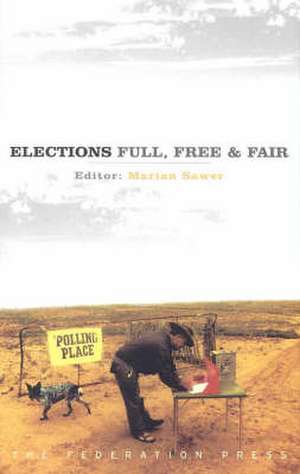Elections: Full, Free and Fair
Autor R. Parkinson Editat de Marian Saweren Limba Engleză Paperback – 31 aug 2001
Preț: 188.60 lei
Preț vechi: 258.43 lei
-27% Nou
Puncte Express: 283
Preț estimativ în valută:
36.09€ • 37.77$ • 30.04£
36.09€ • 37.77$ • 30.04£
Carte indisponibilă temporar
Doresc să fiu notificat când acest titlu va fi disponibil:
Se trimite...
Preluare comenzi: 021 569.72.76
Specificații
ISBN-13: 9781862873957
ISBN-10: 186287395X
Pagini: 256
Dimensiuni: 156 x 242 x 20 mm
Greutate: 0.43 kg
Editura: Federation Press
ISBN-10: 186287395X
Pagini: 256
Dimensiuni: 156 x 242 x 20 mm
Greutate: 0.43 kg
Editura: Federation Press
Cuprins
Contents Pacemakers for the world? Marian Sawer A wider field in a new country: Chartism in colonial Australia Paul A Pickering The story of the ‘Australian ballot’ Mark McKenna Rights without seats: The puzzle of women’s legislative recruitment Diane Sainsbury Preferential voting and its political consequences Ben Reilly Inventing Hare-Clark: The model arithmetocracy Judith Homeshaw cratic experiments with Constitution-making Helen Irving ‘A great leveller’: Compulsory voting Lisa Hill Institutionalising electoral integrity Colin Hughes Delivering democracy to Indigenous Australians Will Sanders Exporting expertise in electoral administration Michael Maley Australian democracy in comparative perspective Arend Lijphart Confidence in Australian democracy Pippa Norris Political parties, partisanship and electoral governance James Jupp and Marian Sawer Notes on Contributors/ Tables, Figures, Illustrations/ Abbreviations/ Index
Recenzii
Did you know, ‘In 1832, during a by-election in Montreal, the army was called in and three people were shot dead. As a result the House of Assembly of Lower Canada adopted a bill depriving women of the right to vote, believing that polling stations had become too dangerous for the weaker sex’. … John Ralston Saul said ‘democracy is a sentence and voting just the punctuation’, but I think this book demonstrates that voting, who votes and how they vote is the demonstration of how we envisage our democracy. Inkwell, January 2002 Professor Sawer’s research is widely respected. This collection, published by the Federation Press, makes an important contribution to our understanding of current thinking not only on Australian democracy but also in such areas as constitution-making and electoral assistance abroad. It is a frank and thought-provoking set of essays … It is not a celebration of Australian achievements or indeed a book which might encourage Australian election officials to ‘rest on their laurels’. A consistent theme of this collection is the issue of why, despite a rich history of respect for democratic procedures, the equity of Australia’s electoral process continues to be challenged. … Australia’s contribution to the international scene is one of the strongest features of this collection. Michael Maley looks at Australia’s ‘exporting’ of expertise in democratic electoral administration … [His] insights are complemented by Arend Lijphart’s comparative perspective and by Pippa Norris’s assessment of ‘confidence in Australian democracy’. … This book is the product of much that is best in Australian electoral studies. The authors reveal plenty about the political forces and individuals who shaped Australia's political system. Australia does genuinely emerge as a ‘pacesetter’ and experimenter, but its authors also look seriously at whether these experiments have worked – and what could have been done better. One can heartily recommend this book …. Representation, Vol 38 (4), 2002 This is a very timely and welcome addition to the literature on elections. … Virtually everyone will be enlightened by the data thus assembled. Virtually every aspect of the past and present conduct of elections is covered with important original research … In many edited works the standard of contributions is uneven, but this is not the case with this volume. Not only is the range comprehensive – this reviewer cannot think of any aspect left uncovered – the contributions are well written and informative. … This volume is a solid scholarly account of where we have come from in electoral terms and will prove a very useful companion to those who teach and research in the area. Australian Journal of Political History, Vol 48, 2002 The book’s appeal will be to the reader with at least a basic background in electoral politics, as well as students keen to flesh out the detail of particular themes in Australian electoral history. … Four broad themes are covered – the development of the electoral process in Australia; current issues with the process; the evolving role of the Australian Electoral Commission; and how Australia’s democratic institutions rate in an international context. The whole combines to leave the reader impressed with Australia’s role as a pioneer in the development of democracy and electoral machinery, more aware of some key issues, but concerned at the potential for interference in the system for partisan purposes. … Current issues dealt with include enfranchisement (for both voters and candidates), the payment of politicians, the funding of elections, voting systems, and types of voting systems. Two key issues, compulsory voting and the use of proportional representation are given their place as longstanding issues of contention. Policy, Vol 18 (2), 2002
